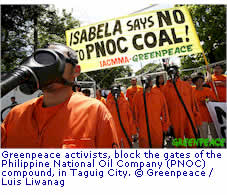According to the environmental group Greenpeace, Fr. Tony Ancieta, a representative of the Isabela Anti-Coal Mine Mouth Alliance stated that “We absolutely reject PNOC’s proposed coal-plant because it will threaten the lives of the people in the surrounding communities.” Ancieta adds, “This coal project will pollute the air and water and ruin crops, devastating health and livelihoods.” Jasper Inventor of Greenpeace points out that “the opposition to the proposed plant in Isabela is a testament to the growing movement against coal throughout the country.” According to Inventor, “There is no future with coal. The government therefore should stop the construction and expansion of more coal plants in the country and initiate a massive shift to clean, renewable energy with a clear target of 10% of our total energy needs generated from sun, wind, and modern biomass by the year 2010.” On the other side of the argument is the PNOC-EC which is actively engaged in the country's search for indigenous sources of energy. According to Eduardo Manalac, its President and CEO, they are "an implementing arm of the government in the promotion of indigenous energy resources to augment the growing energy needs of the country." And indeed local coal has helped the country use less imported oil. According to the Philippine Department of Energy in 2003 "coal production displaced about 6.55 million barrels of fuel oil equivalent (MMBFOE), which amounts to about 176.82 million USD in foreign exchange savings based on yearly average price of 28.00 USD/barrel of oil. That was back in 2003! With the price of oil more than double what it was then, the country can expect even more significant savings should this project go forward. The PNOC-EC
can also point to While Malampaya is managed by a consortium of international oil companies headed by Shell Oil, there are many skeptics who doubt that the PNOC-EC can replicate such success with its Isabela coal project. Where do you stand on this issue? UPDATE
|

 To
raise public awareness to their cause, Isabela community leaders
together with environmental activists recently demonstrated outside the
gates of the PNOC-EC (Philippine National Oil Company-Exploration
Corporation) the government entity that will oversee the proposed energy
project.
To
raise public awareness to their cause, Isabela community leaders
together with environmental activists recently demonstrated outside the
gates of the PNOC-EC (Philippine National Oil Company-Exploration
Corporation) the government entity that will oversee the proposed energy
project.
